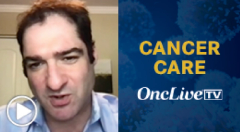
Experts on the Management of Diarrhea Associated With EGFR TKIs
Zosia Piotrowska, MD, Jonathan Riess, MD, MS, Gregory Riely, MD, Emily Skotte, MSN, APRN, ACNP-BC, and Amanda Cass, PharmD, BCPS, discuss the management of diarrhea as an adverse effect associated with EGFR TKIs.
Episodes in this series

Zosia Piotrowska, MD, Jonathan Riess, MD, MS, Gregory Riely, MD, Emily Skotte, MSN, APRN, ACNP-BC, and Amanda Cass, PharmD, BCPS, discuss the management of diarrhea as an adverse effect (AE) associated with EGFR TKIs.
Zosia Piotrowska, MD, is a clinical researcher and lung cancer medical oncologist, Massachusetts General Hospital Cancer Center. Jonathan Riess, MD, MS, is the medical director of Thoracic Oncology, an associate professor of Medicine, Division of Hematology & Oncology, University of California Davis Comprehensive Cancer Center. Gregory Riely, MD, is a medical oncologist in the Department of Medicine, at Memorial Sloan Kettering Cancer Center. Emily Skotte, MSN, APRN, ACNP-BC, is a nurse practitioner in the Thoracic Oncology Clinic, at Vanderbilt University Medical Center. Amanda Cass, PharmD, BCPS, is a clinical pharmacist, the Thoracic Oncology Clinic, Vanderbilt University Medical Center.
Piotrowska, Riess, Riely, Skotte, and Cass explain that it is important to evaluate patients to determine dietary modification and dietary triggers when they receive treatment with EGFR TKIs. If diarrhea progresses, patients should be treated with loperamide hydrochloride (Imodium), and they should be evaluated for electrolyte and rectal function abnormalities.
An educational discussion with patients prior to treatment will allow them to better understand the risks of diarrhea as an AE. Addressing this AE early on is key to make sure the severity does not progress or worsen during the course of treatment.















































